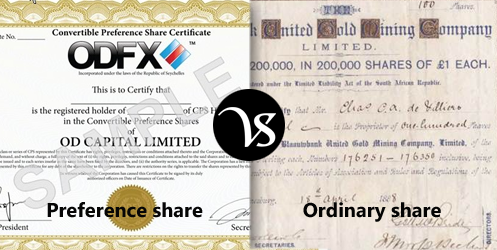 Preference share:
Preference share:
Company stock with dividends which are paid to the shareholders before common stock dividends are paid out. At the time of company bankruptcy, preferred stock shareholders have a right to be paid company assets first. Preference shares pay a fixed dividend. Unlike common shareholders, preference shareholders usually do not have voting rights.
Ordinary share:
Ordinary shares are also known as equity shares. An ordinary share gives the right to the owner to share in the profits of company. An ordinary share is a share of stock giving the stockholder the right to vote on matters of corporate policy and the composition of the members of the board of directors. It is also called common stock.
Differences:
| Basis |
Preference share |
Ordinary share |
Definition
(www.oxforddictionaries.com) |
A share which entitles the holder to a fixed dividend, whose payment takes priority over that of ordinary share dividends. |
A share entitling its holder to dividends which vary in amount and may even be missed, depending on the fortunes of the company. |
| Features |
Its features are:
- Dividends
- Participating preference shares
- Voting rights
- Par value
- Redeemable or callable preference shares
- Sinking fund retirement
- Preemptive right
|
Its features are:
- Limited liability
- Liquidation rights
- Preemptive rights
- Voting rights
- Dividend payments
|
| Synonyms |
Block, holding, share, lot |
Common shares, junior equity |
| Types |
Its types are:
- Cumulative preference shares
- Non-cumulative preference shares
- Participating preference shares
- Non-participating preference shares
- Convertible preference shares
- Non-convertible preference shares
- Redeemable preference shares
- Guaranteed preference shares
|
Its types are:
- Voting ordinary shares
- Non-voting ordinary shares
- Differed ordinary shares
|
| Word origin |
It was originated in between 1835-45. |
It was originated in between 1865-70. |
| Voting rights |
Preference shareholders do not enjoy voting rights. |
Shareholders enjoy any of the voting rights. |
| Pronunciation |
- Eng (UK): /ˈprɛf(ə)r(ə)ns/ /ʃɛː/
- Eng (US): /ˈpref(ə)rəns/ /SHer/
|
- Eng (UK): /ˈɔːdɪn(ə)ri/ /ˈɔːd(ə)n(ə)ri/ /ʃɛː/
- Eng (US): /ˈôrdnˌerē/ /SHer/
|
| Advantages/Benefits |
Its advantages are:
- Appeal to Cautious Investors
- No obligation for dividends
- No interference
- Trading on Equity
- No charge on Assets
- Flexibility
- Variety
|
Its advantages are:
- Ordinary shareholders can vote at company’s annual general meeting and have the ability to elect the board of directors. Each share carries the right to one vote at the meetings.
- The ordinary shareholders are the owners of the business and they can receive dividend from the company out of its profit. The dividends payable are often expressed in terms of cents per share.
|
| Disadvantages |
Its disadvantages are:
- Fixed obligation
- Limited Appeal
- Low return
- No voting rights
- Fear of redemption
|
Its disadvantages are:
- Ordinary shares are one of the riskiest types of investments because there can be no dividend payable during or at the end of the year.
- The shareholders will bear the operational risks of the organization.
- The issue of new shares may result in diluting the shares held by the existing shareholders.
|
| Example in Sentence |
- Preference shares are less risky than ordinary shares.
- The one who bought the preference shares do not have the voting rights.
|
- The company’s ordinary share has the par value of Rs 100 each.
- They have bought the ordinary shares of Minimax Company.
|
 Preference share:
Preference share:




